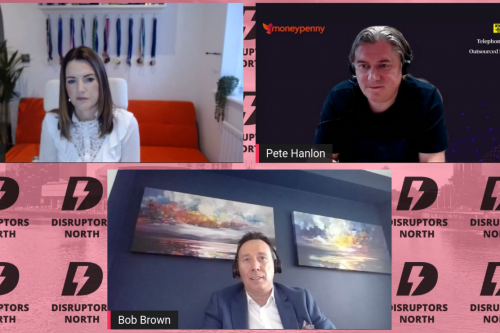Disruptive technology brought to life


The session, entitled Disruptive Technology Brought to Life, was sponsored by Deloitte and sought to highlight how far technology has come, whether it be the move from furrowed brows five years ago about Blockchain being a technology underpinning everything from distribution and supply chain management to underpinning a lot of the activity around cryptocurrencies.

Kent Mackenzie
Kent Mackenzie, partner and global head of fintech and regtech at Deloitte highlighted three key emerging trends.
The first was automation. This was perhaps initially seen as only revolving around the manufacturing industries with the use of robotics, but Mackenzie says now it has progressed to intelligent automation enabling a “panel that sits alongside robotics to make decision on behalf of individuals or on behalf of customers.”
Almost quoting Spiderman he explained: “Of course with that amount of power comes great responsibility, so we have to think about how we make sure there’s no bias in some of the AI routines and that we’re not inadvertently disadvantaging different sections of society by automating certain decisions.”
He said the opportunities within this trend are huge and that automated decision making is entering areas such as financial services, among other sectors.
The next trend highlighted was that of interconnectivity between devices and how these devices “talking to each other” creates avenues for advancement in a host of sectors.
Mackenzie noted that within the next decade or so he expects: “We’ll find that every single device we use in one way or another is connected to and sharing information and influencing our lives.”
He explained there are great opportunities for this within manufacturing or through revolutionising healthcare but that it again requires action to be taken responsibly.
His final trend was also a warning, commenting: “As we hustle towards a digital future and we double down on that based on the pandemic, we’ve got to make sure we don’t create the great digital divide.”
Mackenzie emphasised there is huge amount of digital inequality across some of developing countries. He said everyone from businesses to governments must: “think about what we do to create a balance and to make sure the rising tide [of digital technology] can raise all ships.”

Jonathan Sharp
Jonathan Sharp, director at Deloitte, pointed out the disruptive trends mentioned by Mackenzie were fuelling the deal market globally and across the north of England.
Sharp said: “We’ve seen businesses want to buy other companies that are disruptive, that expand their service offerings or expand their platform.”
He said in the last year, some of the deals which have seen traditional bricks and mortar businesses acquired by ecommerce brands are expected to continue.
He finished by explaining that disruptive businesses will remain incredibly important across the corporate market.
The final speakers of the session picked up on the importance of disruption for businesses. Bob Brown, COO at Medtech firm EMIS Group and Pete Hanlon, the CTO at Moneypenny – the number one outsourced communication provider in the world – explained that in business standing still just isn’t an option.
Hanlon said: “The communication industry is constantly evolving. During lockdown we have seen a seismic shift in the way that people communicate, driven by the mass adoption of video conferencing solutions from Zoom and Microsoft Teams.
“[However] this change didn’t just shift the way people communicate, it kind of changed the expectations of what people feel should be possible for [communications] services like ours.”
He added that for Moneypenny the business saw an opportunity over lockdown to, “build a really deep integration with Microsoft Teams”.
This is believed to be unique in the world and enables the business to take inbound calls through its call centre and send those directly over the internet and into Teams – a service only created because ,”Covid presented a gap in the market and Moneypenny were able to take advantage of it.”
Hanlon concluded: “I think you’ve just got to always be focused on what’s that next thing and [thinking] where are we going to put our focus, regardless of what’s happening in the wider world.”
Brown explained EMIS has worked throughout the pandemic to support the NHS.
He noted as a result of the crisis, a previously siloed world of healthcare has shifted to one in which providers are becoming more joined up. Brown said his Leeds-based business was able to deliver a technology platform that has and is being used to vaccinate the country.

Helen Cutting
He said the challenge was to develop a system that could keep pace and track of the number of vaccinations which were rolling out across the UK, and speak to other platforms to ensure records could easily be updated and accessed.
Brown said: “I think Covid has helped us, in an ironic way, to be able to transform our sector.
“And we continue to look to invest in our technology to see what more we can do at pace, and that’s critical when we consider what is now required from a healthcare sector – it’s very, very different now to what it was.”
Perhaps one of the biggest ways Brown believes disruption has occurred within the sector was mirrored by the point made by Hanlon – that of communication. EMIS now offers a free video conferencing platform to healthcare professional to enable patients to still be seen.
Brown said this shows how disruptive opportunities can come from the unlikeliest of places, in this case a pandemic.
Ultimately, Cutting noted that disruption and innovation are key drivers for those businesses which “really thrive”.
She said these companies often have a passion for innovation, a “hunger” to be first and to think a bit differently from their competitors.

The virtual conference is also being sponsored by Nexus, Curveblock, Stickyeyes, Northern Powerhouse Investment Fund, WeLink and Ribble Cycles. It showcased the businesses already leading the charge and innovating from the north and the next generation of entrepreneurs and companies that are aiming to transform the regional, national and global economy.








